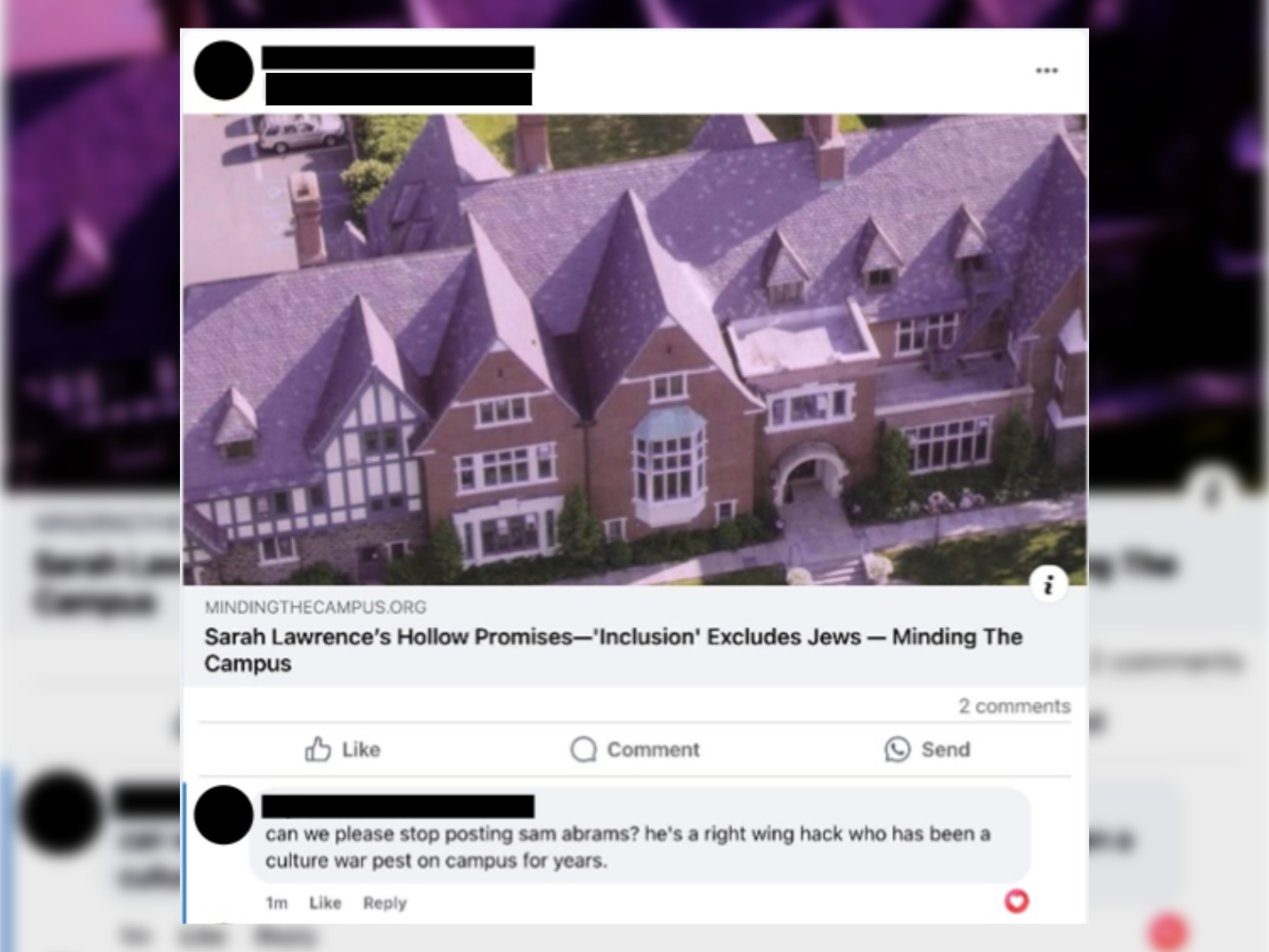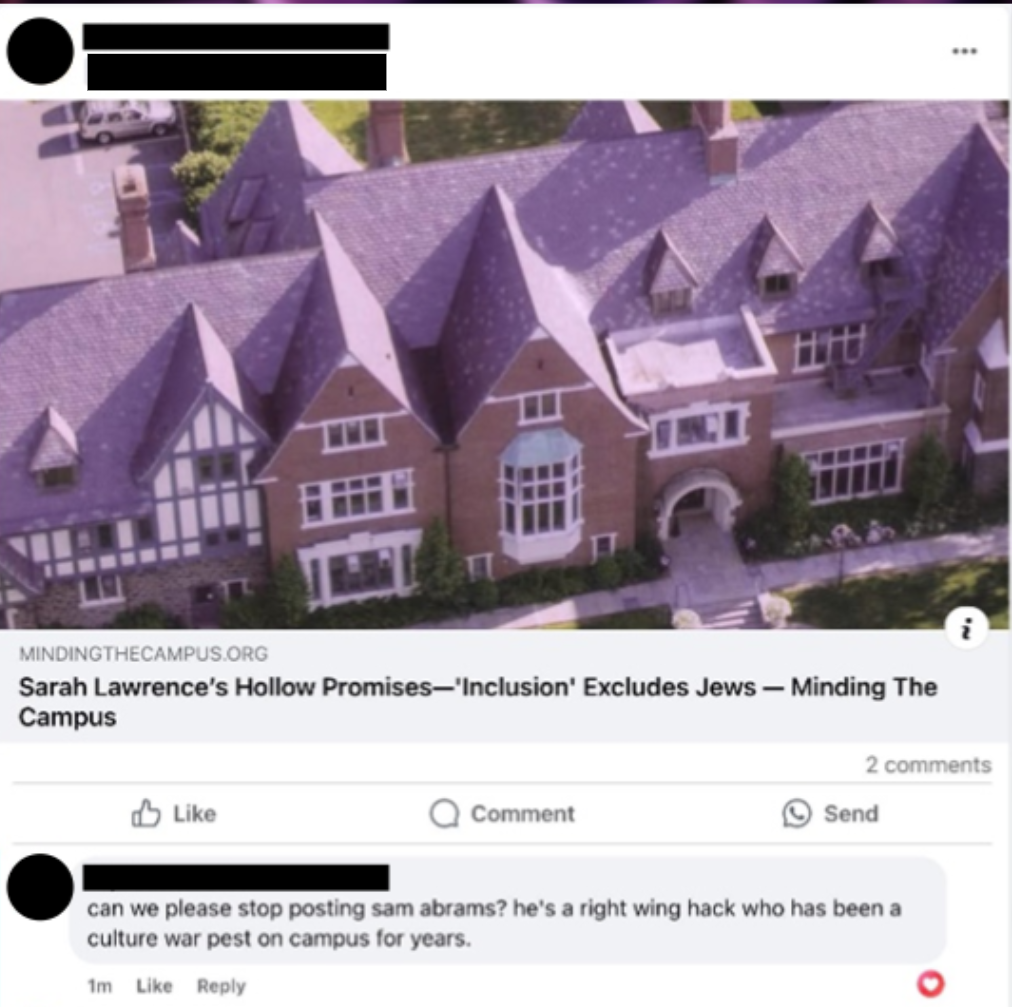
I recently published an article detailing the pervasive anti-Semitic environment at Sarah Lawrence College (SLC), where I have been a faculty member for the past fifteen years. In it, I presented troubling facts about the rise of anti-Semitism on the New York-based campus and shared my perspective on SLC’s handling of these issues.
Rather than engaging with the facts I presented, however, many members of the SLC community chose to dismiss the evidence and instead attack me for my political views. This response reflects poorly on SLC and undermines public confidence in the integrity of higher education in America, an institution already in steep decline.
As a Jew, writing about anti-Semitism is never easy, but some truths must be shared. It is undeniable that several Jewish Zionist students have left the school or switched to fully remote learning due to—at the very least—their perception that SLC has failed to effectively address a toxic environment of threats, intimidation, and harassment.
[RELATED: Sarah Lawrence’s Hollow Promises—’Inclusion’ Excludes Jews]
Understandably, they worry about their safety and the disruption of their learning environment.
By being forced off campus or leaving the school entirely, these students have been denied the same opportunities to engage and thrive on campus as others, solely because of their faith and heritage.
It is also true that SLC is now under investigation by the U.S. Department of Education’s Office for Civil Rights due to serious concerns about its anti-Semitic environment. While many schools have opted to engage with concerns about anti-Semitism and settle Title VI claims, SLC has rejected attempts to resolve the claims with the claimant and address the concerns.
Finally, SLC has indeed allowed a workplace environment to develop where students can disrupt my teaching and academic work and attack me for my faith and Jewish Zionist heritage.
After presenting these facts, I shared my perspective on SLC’s response to these campus issues—specifically, its decision not to settle the Title VI investigation and its choice of leadership. My views are open to debate and disagreement; thoughtful dialogue is both welcome and essential to a healthy intellectual and academic environment.
However—unsurprisingly—that did not happen.
Instead, when my aforementioned article was posted in an alumni group on Facebook, the first response came from a former student who urged the community to stop discussing me—then proceeded to call me “a right-wing hack” and a “pest” on campus.

[RELATED: Sarah Lawrence Leaders Make Hollow Commitments to Free Expression]
This alum couldn’t be bothered to engage with any of the ideas in the article and instead resorted to attacking me—employing a deeply dangerous and horrifying trope once used by the Nazi regime to justify the persecution of Jews and, ultimately, the Holocaust. I’ve been called many things over the years, but it was shocking to be labeled a “pest”—a term historically invoked to justify the extermination of Jews. As the Antisemitism Policy Trust notes, “The pest … is perceived as something which will eat away at society and rot the wood of societal values; it must be eradicated.”
Of course, no one commented on the disgusting use and intention behind the word “pest” as it applied to me.
The online reactions continued with practically no discussion about the facts presented in the piece or dialogue over my concerns with the school’s leadership. However, community members had no issue mentioning my work with the American Enterprise Institute (AEI) and calling me divisive. One post even went as far as to say, “I wouldn’t want the crimes of the Zionists on my conscience. It’s not surprising that student is afraid.” I read this as a real corporal threat and am glad that this student left campus. Such a comment is threatening on many levels and should not go unanswered as it directly conflicts with the school’s oft-stated but empty foundational “principles,” which include ”non-discrimination and respect for the flourishing of every individual; academic freedom; free expression; and mutual respect.”
The responses to my piece are dangerous and reveal SLC’s failure as an educational institution. Sarah Lawrence—along with so many other colleges and universities as well—has clearly failed to create an “inclusive, intellectually curious, and diverse community” on campus and among its graduates in which “the presence of people with different experiences and ideas, engaged in critical dialogue, overcomes ignorance and builds trust and knowledge.” Apparently, just the opposite has occurred.
As a social science professor, I have no interest in telling students what to think. I aim to teach them how to think—how to question, establish facts, and critically engage with all ideas. Intellectual progress and societal betterment come from viewpoint diversity and the rigorous scrutiny of ideas. Yet, the reactions to my concerns about Sarah Lawrence College and the real danger of hatred towards its Jewish community members show how the school has devolved into an illiberal environment, where empathy is replaced by hostility and a desire to harm those with differing views and foundational beliefs.
Those numerous alumni who have engaged in anti-Semitic behavior serve as a stark reminder that SLC has not instilled the critical thinking skills necessary to foster a truly open and tolerant society.
Image: Screenshot of Facebook comment, edited using Adobe.
Respectfully, I would not make being called a “pest” into antisemitism. Yes, I know that Zyklon B initially was a pesticide, but then Zyklon A (i.e. the original Zyklon) was also a pesticide until it got banned at the end of WW-I because the Germans had used it as a chemical weapon on the battlefield. The active ingredient in both, hydrogen cyanide, had been used as an insecticide in California since the 1880s.
I’d suggest doing this for a larger reason — the fascist culture of modern academia routinely dismisses its critics as “pests.” As you point out, it was used to dismiss you and to avoid having to answer your argument — but not because you are Jewish. I’ve had the same thing done to me with some frequency, and I’m not.
Instead it is a reflection of just how fascist higher education has become — fascist as in everyone thinks the same way, everyone wants to think the same way, and anyone who is different belongs in the madhouse.
As bad as antisemitism is, as much as antisemitism has infected higher education, I still think that this is actually worse in that it indicates that the American mind has actually closed.